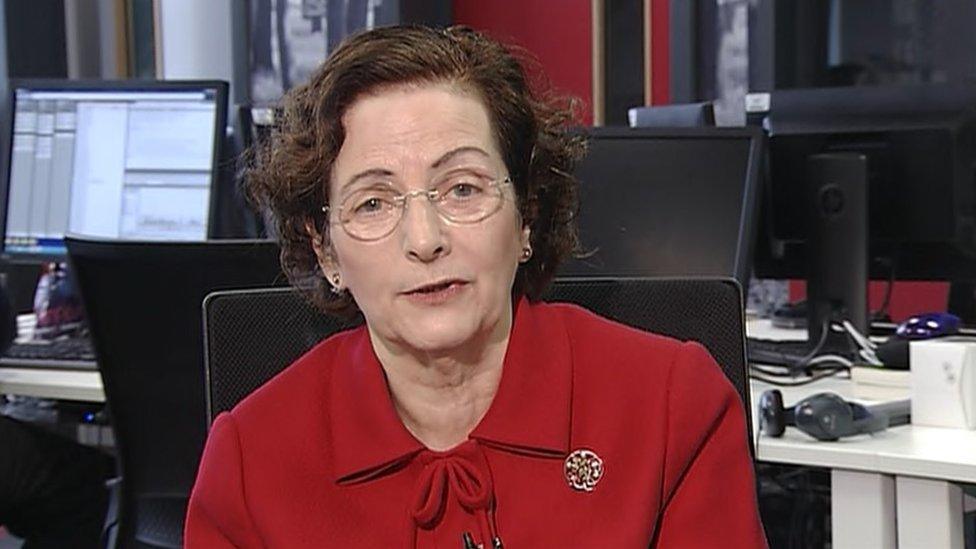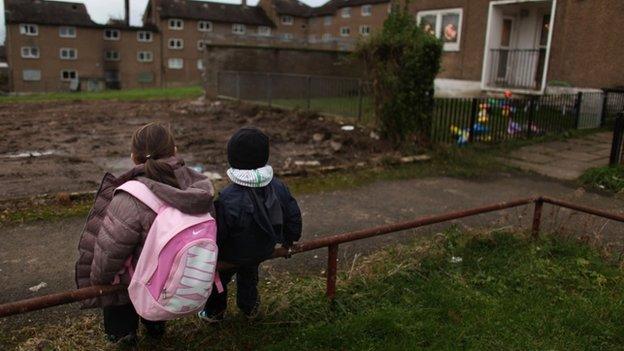Poverty adviser 'was not compromised'
- Published

Ms Eisenstadt has been reappointed as the Scottish government's poverty adviser
The Scottish government's independent adviser on poverty has denied being put under pressure to water down a key report.
The report by Naomi Eisenstadt set out 15 recommendations for what more could be done to tackle poverty.
An early draft of the document warned about the potential impact of cuts to local government funding.
But the section was deleted, and did not appear in the final version that was published last year.
Changes were also made to sections covering the impact of the council tax freeze and universal benefits such as free bus travel and fuel allowances for older people.
Two draft versions of the poverty report were given to The Times newspaper , externalunder freedom of information rules, and have now been obtained by BBC Scotland.
She told the The Times that she had "certainly" agreed to change a heading that read "end the council tax freeze" to one that said "be bold on local tax reform".
But she said she could not remember whether she had been asked to change anything else.
Ms Eisenstadt acknowledged to BBC Scotland that there was a "perception" that her independence had been compromised.
She added: "Personally I don't feel that, because had I felt that during the production of the report I would have walked away - I would have just resigned."
The Scottish government said Ms Eisenstadt had "robustly" held it to account.
The documents show that Ms Eisenstadt had initially written that the SNP's council tax freeze policy "is not an anti-poverty measure", which was later changed to "is no longer an anti-poverty measure" in a second draft before being removed from the final report.
A line stating that the council tax freeze "should end" was changed to a call for the Scottish government to "consider ending the council tax freeze".
A further section on the impact of cuts to local government funding was deleted entirely.
It had initially read: "The Scottish government needs to monitor carefully the impact of reductions in local authority funding, and consider with great care how the Spending Review later in the year can support local authorities to keep prioritising so-called 'pro-poor services - those largely used by those on low incomes."
Ms Eisenstadt, who was appointed in June 2015, met First Minister Nicola Sturgeon in November of the same year to discuss her progress.
She said she believed that "working constructively with government and trying to make change is the right way to go".

Ms Eisenstadt said she was happy with the progress that had been made since her report was published
She added: "I don't think that my independence was compromised, and looking at the recommendations I feel really proud of how much is being done based on the report.
"So the real test is are they doing what I said they should do? The answer to that is: most of it, yes."
When asked whether people should be concerned about the changes to the report, she replied: "I don't think so because you have to look at what is still there and how much is happening, and the truth is there have been reforms to the council tax.
"Now I don't know if that would have happened anyway, but at least there is movement in the direction that I was hoping it would be.
"By working alongside (the government), it doesn't compromise your independence - what it does is you develop each other's thinking, you learn from each other, and I had to learn a lot about what the Scottish context was."
'Announced its plans'
A Scottish government spokeswoman said Ms Eisenstadt had made clear that the recommendations in her report were hers alone.
The spokeswoman added: "The recommendation to end the council tax freeze is included in both the two draft reports and the final report.
"The Scottish government announced its plans to end the council tax freeze in March 2016, two months after the publication of the adviser's report.
"The text of all drafts and the final report is the responsibility of the independent adviser."
Scottish Labour has accused the Scottish government of "whitewashing" the poverty report.
But its attempt to ask an emergency question on Ms Eisenstadt's report at Holyrood was turned down by presiding officer Ken Macintosh.